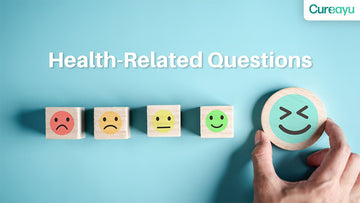Health is a topic that concerns everyone, and the more we learn about it, the better decisions we can make regarding our well-being. From nutrition to exercise, mental health to chronic diseases, there are endless health questions that people seek answers to daily. In fact, understanding key aspects of health can be a game-changer in improving overall quality of life. That’s why it’s essential to address common health-related questions that arise, especially when it comes to maintaining a balanced and healthy lifestyle.
In this blog, we will delve into some of the most frequently asked health questions. Whether you're curious about how much exercise you really need or confused about the best diet for your body, we’ve got you covered. This comprehensive guide will provide detailed answers to the top health questions to empower you with knowledge to live a healthier life.
Also Read: Top 15 Heart Healthy Foods
Top 10 Health Questions and Answers
1. How much exercise should I be getting weekly?
The World Health Organization recommends adults get at least 150 minutes of moderate-intensity aerobic activity or 75 minutes of vigorous-intensity exercise each week. This can be broken down into 30 minutes a day, five days a week. Adding muscle-strengthening activities at least twice a week further boosts overall health. Consistency is key for long-term benefits, including reduced risk of chronic diseases and improved mental well-being.
2. What is the healthiest diet to follow?
The healthiest diet is one that includes a variety of whole foods like fruits, vegetables, whole grains, lean proteins, and healthy fats. A balanced diet such as the Mediterranean diet, which emphasizes olive oil, fish, legumes, and fresh produce, is often considered ideal for heart health and longevity. Avoiding processed foods, refined sugars, and excessive salt is crucial to maintaining a healthy body.
Also Read: Top 10 Ayurvedic Companies in India: A Journey Through Herbal Excellence
3. How much water should I drink daily?
While the standard recommendation is eight 8-ounce glasses a day (about 2 liters), individual water needs can vary. Factors like your physical activity, climate, and overall health influence hydration requirements. A good indicator of adequate hydration is light-colored urine and a general sense of well-being throughout the day.
4. How can I improve my mental health?
Improving mental health involves taking care of your body and mind. Regular physical exercise, sufficient sleep, a balanced diet, and social interactions are essential. Practicing mindfulness techniques such as meditation and journaling can also help. If you are struggling with mental health issues like anxiety or depression, seeking professional help from a therapist or counselor can be life-changing.
5. What are the signs of a weak immune system?
A weak immune system is often indicated by frequent infections, slow-healing wounds, digestive problems, and chronic fatigue. If you find yourself catching colds often, it may be a sign your immune system needs strengthening. Improving immunity can be achieved through regular exercise, a nutritious diet rich in vitamins like Vitamin C, getting enough sleep, and managing stress levels.
Also Read: The Importance Of Nutrition: Key to a Healthier Life and Optimal Well-being
6. Is it normal to feel tired all the time?
Feeling tired constantly could be a result of various factors such as lack of sleep, poor nutrition, dehydration, or an underlying health condition like anemia, thyroid dysfunction, or chronic fatigue syndrome. If persistent fatigue affects your daily activities, it’s a good idea to consult a healthcare provider for further investigation and appropriate treatment.
7. How often should I get a medical check-up?
For most adults, it is recommended to get a full medical check-up once a year. Regular health screenings can catch potential issues early, allowing for preventive measures or treatment before conditions worsen. Depending on age and personal risk factors, your doctor may recommend additional tests for conditions like high cholesterol, diabetes, or cancer.
8. What are the best ways to maintain a healthy weight?
Maintaining a healthy weight involves balancing calories consumed with calories burned through physical activity. A combination of a nutritious diet with portion control, regular exercise, and positive lifestyle habits like getting enough sleep and managing stress is key. Avoiding fad diets and focusing on long-term, sustainable habits is crucial for lasting success.
9. How can I reduce my risk of heart disease?
Heart disease can be prevented by adopting a heart-healthy lifestyle. This includes eating a balanced diet low in saturated fats, maintaining a healthy weight, not smoking, and keeping alcohol intake within moderate levels. Regular exercise, managing stress, and monitoring blood pressure and cholesterol levels also play a critical role in reducing the risk of cardiovascular diseases.
10. What should I do if I experience frequent headaches?
Frequent headaches can be caused by various factors such as dehydration, poor posture, eye strain, or underlying conditions like migraines or hypertension. It is essential to identify triggers that may be causing your headaches. Simple remedies like staying hydrated, improving posture, and managing stress can help. However, if headaches persist, seeking medical advice to rule out serious conditions is recommended.
Also Read: Top 10 Frequently Asked Questions About Ayurveda
Conclusion
Taking charge of your health starts with asking the right questions and seeking accurate answers. Understanding how much exercise you need, the importance of a balanced diet, and the steps to maintain mental and physical well-being are essential for living a healthier, more fulfilling life. Regular medical check-ups, along with self-care practices like hydration, proper sleep, and mindful eating, all contribute to long-term health benefits.
By staying informed and addressing common health concerns proactively, you can reduce your risk of chronic diseases, improve your mental resilience, and lead a more active lifestyle. Remember, there’s no "one-size-fits-all" approach to health, so find what works best for you and stick with it. Most importantly, when in doubt, don’t hesitate to seek advice from a healthcare professional who can provide personalized guidance based on your needs.








